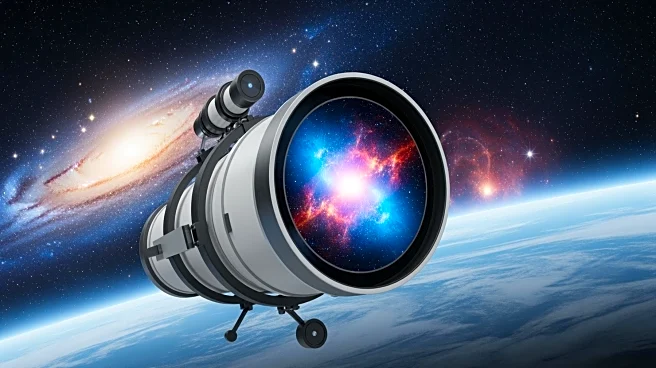What's Happening?
The Euclid Space Telescope, initially tasked with mapping the 'dark universe' of dark energy and dark matter, is set to have its mission extended by eight years due to additional fuel reserves. Dr. Luigi 'Rolly' Bedin from the Astronomical Institute of Padova
has proposed utilizing this extended period to transform Euclid into a powerful astrometric telescope. This would involve repeating its initial mission to gather a second set of data points, allowing scientists to calculate 'proper motion'—the movement of closer objects like stars against distant galaxies over time. This approach could significantly enhance the understanding of stellar movements and distances, complementing the capabilities of the Gaia telescope, which has limitations in observing fainter objects.
Why It's Important?
The proposed extension of Euclid's mission could have profound implications for astronomical research. By focusing on astrometric observations, Euclid could identify billions of faint and distant sources that Gaia cannot detect, thereby expanding the scope of cosmic mapping. This would not only improve the accuracy of existing datasets but also provide new insights into the structure and dynamics of the universe. The ability to calculate proper motion and parallax with greater precision could lead to breakthroughs in understanding the Milky Way and other galaxies, potentially influencing future space exploration and research priorities.
What's Next?
If Dr. Bedin's proposal is accepted, Euclid's extended mission would require careful planning and engineering adjustments to accommodate the new observational goals. The European Space Agency (ESA) would need to evaluate the feasibility of these changes and potentially collaborate with other astronomical observatories to maximize the scientific output. The success of this mission could pave the way for similar extensions of other space telescopes, encouraging innovative uses of existing resources to advance scientific knowledge.
Beyond the Headlines
The extension of Euclid's mission highlights the importance of resource optimization in space exploration. It underscores the potential for existing technology to be repurposed for new scientific endeavors, challenging the traditional lifecycle of space missions. This approach could inspire future projects to incorporate flexibility in mission design, allowing for adaptive strategies that respond to emerging scientific questions and technological advancements.

















